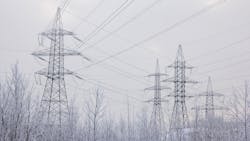ERCOT Files Preliminary Report With Texas Regulators On February Extreme Weather Event
ERCOT on April 6 filed with Texas regulators a preliminary report on the causes of generator outages and derates during the Feb. 14-19 extreme cold weather event, noting that the highest amount of unavailable capacity during that period occurred on Feb. 16 at around 8 a.m., and was 51,173 MW.
The majority of the outages at that time on Feb. 16 were weather related (27,472 MW, or 54%), followed by existing outages (7,487 MW, or 15%), equipment issues (6,986 MW, or 14%), fuel limitations (6,124 MW, or 12%), frequency related (1,260 MW, or 2%), and transmission loss (1,259 MW, or 2%), for instance.
The preliminary report added that the total outaged and derated capacity at that time is different than what was previously reported (52,277 MW) due to additional information received in response to requests for information (RFIs).
Existing outages are generator outages or derates that started before the issuance of the operating condition notice on Feb. 8, and includes ongoing planned and forced outages, as well as seasonally mothballed units. The report added that fuel limitations involve generator outages or derates due to lack of fuel, contaminated fuel, fuel supply instability, low gas pressure, or less efficient alternative fuel supply.
Weather-related generator outages or derates are explicitly attributed to cold weather conditions in the RFI responses, including such frozen equipment as frozen sensing lines, frozen water lines, and frozen valves; ice accumulation on wind turbine blades; ice/snow cover on solar panels; “exceedances” of low temperature limits for wind turbines; and flooded equipment due to ice/snow melt, the report said.
Equipment issues involve generator outages or derates due to facility equipment failures or malfunctions not explicitly attributed to cold weather in the RFI response, while transmission loss refers to generator outages or derates due to forced outages on directly connected transmission facilities, the report said.
Among other things, the report said that frequency related outages are generator outages or derates attributed to frequency deviations from 60 Hz, and include automatic tripping due to under-frequency protection relays and any automatic or manual tripping attributed to plant control system issues related to frequency deviation.
As noted in the preliminary report, for the purposes of the document, an “outage” is the complete unavailability of a generator’s capacity, while a “derate” is the partial unavailability of that capacity.
Noting that all generator outage and derate values reflected in the report are based on generator nameplate capacity, the report said that since wind and solar output is typically much lower than the specified nameplate capacity, the outage and derate MW values used for those units to develop the report are generally much higher than the actual amount of power that would have been available in the absence of the outage or derate.
ERCOT said in its filing that the report provides information on the causes of the outages and derates throughout the weather event based on its review of information submitted by Qualified Scheduling Entities (QSEs) in response to ERCOT’s first RFIs. The QSEs representing generators attributed their outages and derates to several different causes, and that aggregated presentation provides a view of why the generators believe that their units experienced outages or derates, ERCOT said.
Noting that it has submitted additional RFIs to QSEs to gather outage cause information for operating days Feb. 10-13, ERCOT said that when additional information is available, it will supplement the attached information, further summarizing the stated causes of the outages and derates.
ERCOT said that it anticipates completing the final event analysis report for the February extreme cold weather event by the end of August.
ERCOT noted that it is not able to disclose at this time the QSE-specific answers to the RFIs, which were answered as confidential requests. ERCOT said that in many cases, the information about generator-specific outage causes were designated by QSEs as resource-specific design or engineering data, which further limits ERCOT’s authority to disclose the generators’ information.
